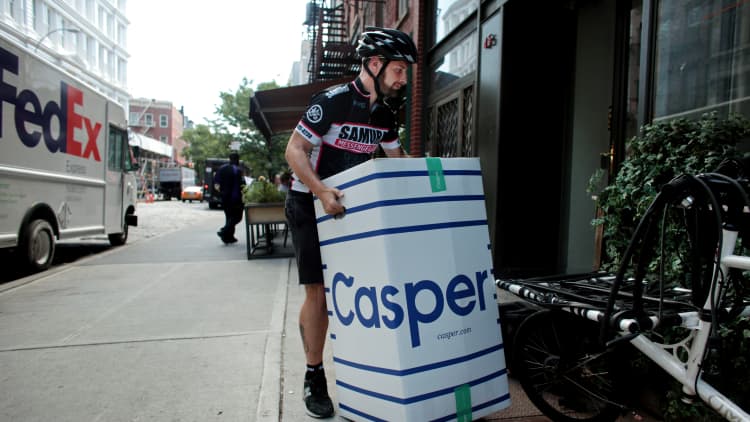
Mattress startup Casper Sleep disclosed in a government filing Wednesday that it would cut its initial public offering price to a range between $12 and $13 per share, down from a prior range between $17 and $19.
The top end of the new price range values the company around $520 million, down from $760 million based on the prior price range. That's also well below the valuation implied by its latest round of private funding that valued Casper at $1.1 billion.
Casper, which began selling mattresses on the internet five years ago, earlier this month announced plans to take the company public on the New York Stock Exchange under the ticker symbol "CSPR." It plans to sell some 9.6 million shares, including underwriters' options.
The latest in a string of IPOs over the last couple years, Casper represents much of what Silicon Valley investors have flocked to in recent years: Big ideals and vision with less initial emphasis on balance sheet fundamentals and earnings.
Some have worried, however, that company's current finances could prove too expensive for a public marketplace more skeptical of newfound brand power and promises to revolutionize an otherwise stale industry.
The self-described "pioneer of the sleep economy" disclosed earlier this month that it lost $92.1 million in 2018 and $73.4 million in 2017, according to its stock registration statement with the Securities and Exchange Commission. It said it brought in net revenue of $357.9 million in 2018, of $250.9 million in 2017 and of $169.1 million in 2016.
Still, Casper argues it's an emerging growth company and values the global sleep economy at $432 billion and the U.S. sleep economy at $79 billion.
"We believe sleep is rapidly becoming the third pillar of wellness and is poised to undergo the same massive transformation that fitness and nutrition have as they became major consumer categories," it said in its SEC filing. "We bring the benefits of cutting-edge technology, data, and insights directly to consumers. We focus on building direct relationships with consumers, providing a human experience, and making shopping for sleep joyful."
The company now sells a variety of bedroom furniture and fixtures including pillows, sheets and lamps. It has also opened 60 of its own brick-and-mortar stores and has partnered with wholesale partners like Target. Casper said that as of Dec. 31, it employed 597 people full time and 234 people part time.
Casper's initial public offering later this year will come on the heels of other high-profile listings including apparel retailer Revolve and online pet company Chewy.


